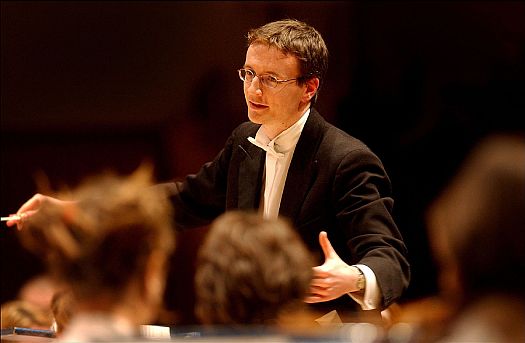 United Kingdom Malagnini, Bruch, Elgar: BBC Philharmonic Orchestra, Gary Walker (conductor), John Bradbury (clarinet), Steven Burnard (viola), Westmorland Hall, Kendal, Cumbria, 14.01.2012 (MC)
United Kingdom Malagnini, Bruch, Elgar: BBC Philharmonic Orchestra, Gary Walker (conductor), John Bradbury (clarinet), Steven Burnard (viola), Westmorland Hall, Kendal, Cumbria, 14.01.2012 (MC)
Maurizio Malagnini: Running in the Clouds (World première)
Max Bruch: Double Concerto for clarinet and viola, Op.88 (1911)
Sir Edward Elgar: Symphony No. 1, Op. 55 (1907/08)

The concert was being broadcast live on BBC Radio Cumbria and recorded for future broadcast on BBC Radio 3.
Browsing through some old concert calendars shows that the BBC Philharmonic has a long tradition of premiering new works. Clearly only a minute number stay in the orchestra’s own repertoire, never mind the standard repertoire. In two months alone in 1983 I remember attending the BBC Philharmonic performing the premières of five reasonably challenging works by five different composers, and unless I’ve missed something all of them sank without trace.
The old market town of Kendal in South Lakeland, Cumbria was chosen for the world première of Maurizio Malagnini’s Running in the Clouds, a score commissioned by BBC Radio 3 that celebrates fell running in the Lake District. The inspiration for Malagnini’s eight movement orchestral suite was the legendary fell runner Joss Naylor. This is a musical depiction of the legendary runner’s memories of completing the gruelling 70 mile circuit known as Bob Graham Round, that includes over 42 peaks, within 24 hours. Malagnini’s musical depiction of the intimate relationship between the runner and his environment reveals itself as a well crafted score of appealing if undemanding music. It was well received by the Kendal audience who clearly appreciated a new score that portrayed their Cumbrian locality. Descriptive titles added to the attraction of the score, yet I soon lost track of my whereabouts on the circuit. But it didn’t seem to matter. Energetically performed, Malagnini’s colourful and often vigorous excursion contains all the rather predicable winding up and winding down, taking the listener up craggy peaks and down verdant valleys. However I was glad when my fell running was over. Given Malagnini’s background in television and cinema, it was no surprise that Running in the Clouds reminded me of the sound world of a stereotypical film score such as I had heard that afternoon in John William’s soundtrack to Steven Spielberg’s film War Horse. History dictates that after their initial programming new scores will soon fade from view, unless they are remarkably inventive or exceptionally memorable; sadly Running in the Clouds was none of these.
Another score somewhat lacking in memorability is Bruch’s late Concerto for clarinet and viola,a work that is a relative stranger to the concert hall. Certainly Bruch could write highly melodic music with striking tunes when he wanted but thisdouble concerto, although attractive and beautifully written, lacks his finest inspiration and doesn’t linger in the memory. In truth the work feels more like an eighteenth-century Sinfonia concertante than a virtuosic Romantic concerto. Hearing the piece played live in concert reveals another drawback to Bruch’s writing. Although the clarinet and viola are designed as equal partners the amplitude and carry of the woodwind instrument overpowers the more subtle sound of the viola. Clarinettist John Bradbury and violist Steven Bernard worked hard, often finding beauty and restrained passion in a sympathetic if low key performance.
After the interval we heard Elgar’s Symphony No. 1, a work in a completely different league compared to what had gone before. Conductor Hans Richter had said to his players prior to the first London performance in 1908, “Gentlemen, now let us rehearse the greatest symphony of modern times, written by the greatest modern composer – and not only in this country.” Entrusted with such a marvellous and demanding work as Elgar’s First Symphony Gary Walker made the most of his opportunity taking an active role with his sweeping gestures and clear entry point indications. Taken initially very slowly the broad, noble march theme which recurs in each of the movements threading through the whole structure was as memorable as I have heard. Walker’s control of the increase in weight and tempo was highly impressive too. The scuttling and darting main theme of the Scherzo-like second movement contained an impressive thrusting momentum. Not surprisingly Elgar’s colourful consoling music has become indelibly associated with imagery, especially of the monarchy of Edwardian England. I was able to visualise the pageantry of a ceremonial event in Whitehall and then refocus to imagine rowdy Parliamentary debate. Walker’s transition to the heartbreaking theme of the wonderfully lyrical Adagio was impressive, creating intensely passionate music that combined with the scent and sounds of nature. Towards the conclusion of the movement it felt like the deep sorrow of lovers parting perhaps on a long ocean voyage. (For a time the spell was rather broken by a noisy persistent vehicle alarm sounding suspiciously as if it had come from one of the BBC service vehicles used by the Orchestra and radio broadcast team.) Beginning almost furtively with an undercurrent of foreboding the final movement contained robust rhythms and telling forward momentum. I enjoyed the passage high in buccaneering spirit before the return of the principal march theme. It is easy to imagine music of such grandeur depicting an important state occasion in Horse Guards Parade.
On splendid form under Gary Walker the BBC Philharmonic strings improve each time I hear them, especially the silver-toned high strings. I must mention the beautiful woodwind playing and the glowing brass section were in tremendous form. Few can have gone away into the bitter cold Cumbrian air without Elgar’s memorable melodies whirling around in their head.
The concert was broadcast live on BBC Radio Cumbria and recorded for future broadcast on BBC Radio 3
Michael Cookson